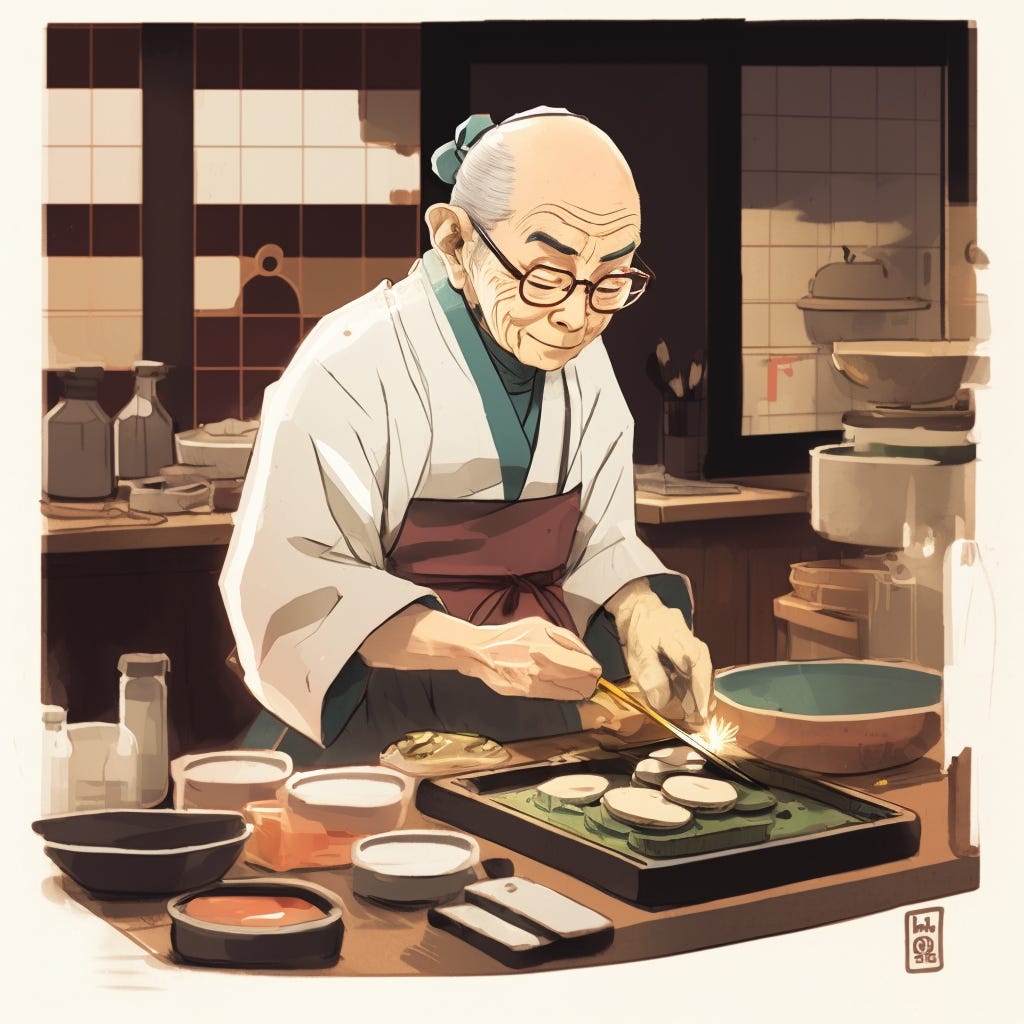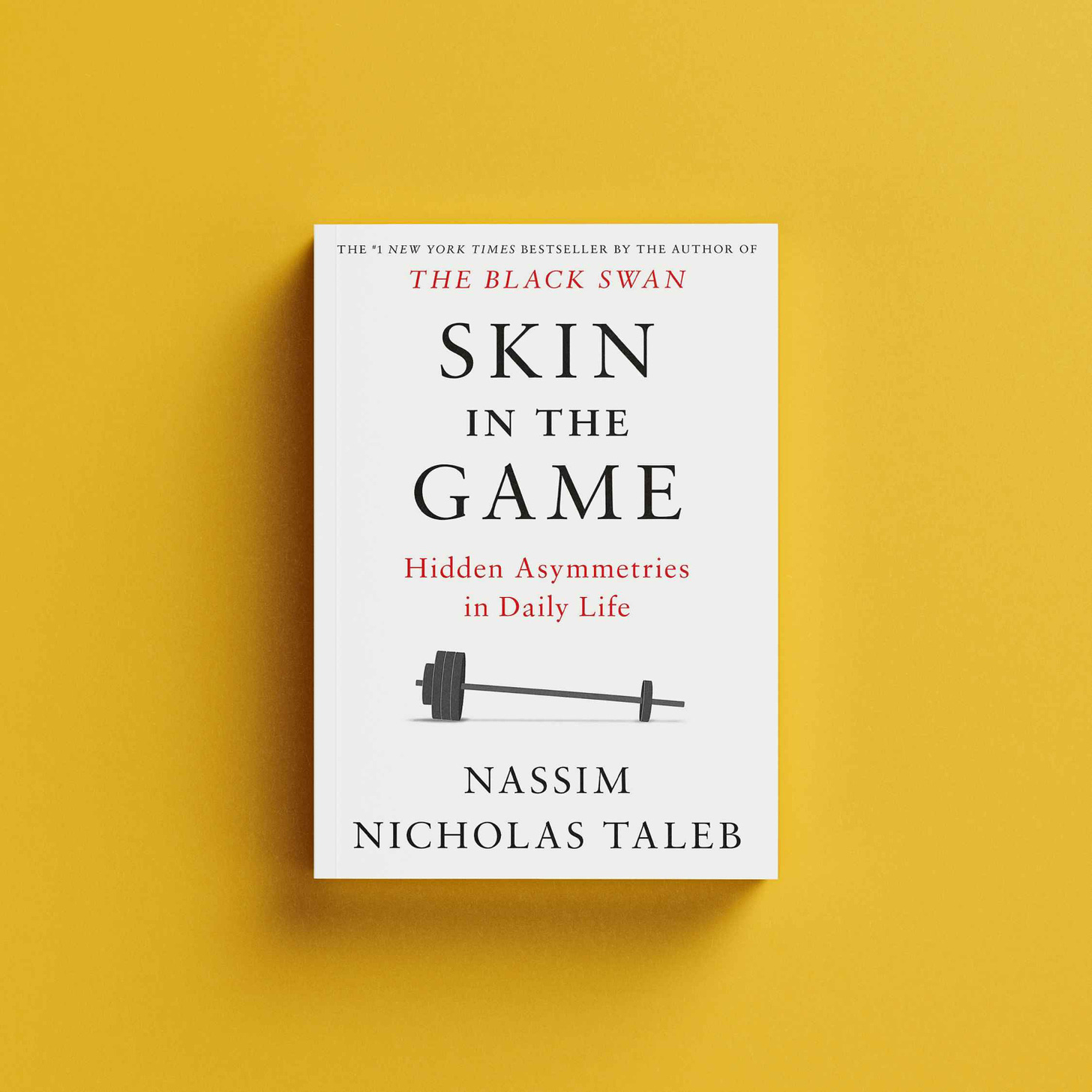I recently watched Jiro Dreams of Sushi.
It tells the story of 97-year-old Jiro Ono, the owner of a sushi restaurant called Sukiyabashi Jiro in Tokyo, Japan.
The outside of the restaurant is the most unexciting and unassuming restaurant you’d ever visit.
So why would they even make a documentary about this restaurant?
Well, this is the first sushi restaurant in the world to receive 3 Michelin stars. To help you grasp how difficult that it is, according to Google, there are 15 million restaurants (this includes pubs and cafes) in the world, and only 142 restaurants (at the time of writing) have 3 Michelin stars. That puts Sukiyabashi Jiro in the top 0.001%.
So what makes Sukiyabashi Jiro so special to receive three Michelin stars?
Supposedly, it has amazing-tasting sushi. Every part of the sushi-making process is crafted with immense care and detail. Mr Jiro Ono is an artist. A craftsman. And he’s dedicated every waking moment of his life towards making the world’s best sushi. Despite the recognition and awards and being 97 years old, Jiro is still committed to learning and improving his craft.
You can see this in the little details – Jiro explained that if an octopus is massaged for 45 minutes instead of 30, the extra 15 minutes bring out more flavour. Or when a couple comes to the restaurant, Jiro makes the pieces of sushi for the women slightly smaller. He explains that women have smaller mouths, and he wants couples to enjoy the sushi together and finish each piece of sushi at the same time — How romantic.
Everything Jiro does has incredible focus and attention to detail. The Japanese would say Jiro has kodawari – the uncompromising and relentless pursuit of perfection to a craft.
Jiro has what I call soul in the game.
What Is Soul In The Game?
I first learned about the concept of having soul in the game from Nassim Nicholas Taleb in his book Skin In The Game: Hidden Asymmetries In Daily Life.
To understand what soul in the game is, I first must explain its younger sibling skin in the game – someone who has a vested interest in the outcome of an event and, more importantly, has something to lose.
Taleb argues that you want to interact with people who will not only share upside rewards but also downsides too. For example, a management consultant gets paid to pitch ideas on how to improve business performance. The advice they give to you may not be in your best interest, but it’s in their interest for you to buy whatever they’re selling and fatten up their bonuses. This also happens a lot in other industries.
As Taleb writes in Antifragile: Things That Gain From Disorder, “Never ask the doctor what you should do. Ask him what he would do if he were in your place. You would be surprised at the difference.”
I’ve had skin in the game since I started playing poker. Call it the gambler in me, but I believe you should put your money where your mouth is. Even my life post-poker is designed to have skin in the game – starting businesses, structuring some copywriting offers based on return on investment (ROI) and so on. I share the upside and downsides of my work with my clients. Of course, not everyone is open to doing ROI fees, but having skin in the game incentivises me to do some damn good work and deliver results.
Soul in the game is the elevation of skin in the game. It’s the older sibling. To fully understand it, we have to start with the soul. A soul is the immaterial part of us. It’s our spiritual essence. Game is whatever creative endeavour we choose to pursue we believe is worthy of our time and effort. This could be building a business, painting, making sushi, bodybuilding, climbing, investing, writing and so on.
When you have soul in the game, this pursuit consumes all of you — every drop of your attention, strength and love. It’s more than just sharing the upside and downside. It becomes indistinguishable from your identity, like Jiro and his sushi, Warren Buffett and investing, and Frida Kahlo and her portraits. When someone has soul in the game, you immediately know it.
When you love what you do, your work stops being work. No matter what it is, you do it with all your pride, love and care. In other words, having soul in the game is obsession.
What’s The Amount?
The documentary depicts Jiro’s unrelenting obsession and commitment to sushi. It sounds silly to be so obsessed with sushi, but I have great admiration for people like Jiro. They see the act of doing their craft as the reward. They’re uncompromising and refuse to break even for financial gain.
Jiro’s restaurant has only 10 seats. There is no menu. The cost of the meal is about $300 each. And you cannot make a reservation at Sukiyabashi Jiro. In fact, in 2019, Michelin removed the 3-star rating all because the restaurant didn’t take reservations. If money was the primary motivation for Jiro, he would have expanded his restaurant, doubled his prices and implemented a booking system. Yet he hasn’t. Money, for Jiro, isn’t the goal. His goal is to make the best damn sushi in the world.
I’m not quite at Jiro’s level, but I do relate to this sentiment. Back when I was a poker player, I used to wake up and scroll on my phone for hours, dreading the day ahead.
Fast forward to today, and I get excited to wake up to read and write. I want to commit the rest of my life to learning, thinking and exploring ideas. I’m no master, but the fact that I get to do it brings me so much fulfilment.
I remember at 18 years old, feeling envious of my classmates who seemed so sure about what they wanted to do. They’d proclaim with such conviction, “After attending [insert ivy league university], I want to be a doctor” or “I want to be an investment banker.” I felt so much pressure to have it all figured out.
I know I picked poker, but it was out of mere convenience. Even in my eight professional years, I felt desperately lost. But somehow muddling through the messiness of life, I’ve discovered the perfect job for me.
I used to write on Medium. I was doing reasonably well, growing the account from 0 to over 400 followers in under a year and getting paid $100+/month. But after going relatively viral a few times, I left the platform.
Deep down, I knew I was writing for claps, followers and virality. In other words, I was writing for the algorithm. When you write the for algorithm, the style of writing follows a formula. There’s nothing wrong with wanting to write that way, just that it wasn’t the game I wanted to play.
I have yet to achieve Jiro’s level of dedication, but I know reading and writing is all I want to do. Last year, my youngest aunt asked me, "what's the amount of money you need to quit everything you're doing?" Honestly, even if someone handed me £1 billion, my life wouldn’t change – I’d still read and write. Okay, perhaps I’d buy a nice house near the peak district to climb outdoors and start a fund managing money for my family, but my daily life wouldn’t change – I’d still remain a student of life.
In my twenties, I was always in a rush to reach the destination. I wanted to get rich quick. I wanted to retire early. I wanted to win. But with my foot slammed against the accelerator, I was always crashing and burning out.
31-year-old Jason is (hopefully) a little bit wiser. Now I don’t care so much about the destination. The only thing that matters to me is to learn as much as I can and strive to improve my writing every day. I’m in the relentless pursuit of perfection. I know I will never reach it, and I’m okay with that. Yes, I’ll always yearn for more. But it pushes me to keep climbing sustainably, trying to reach the top, but not knowing where the top is.
The Last Gambit
There’s one last gambit to having soul in the game — Your pursuit has to leave society in a better place as a whole when you exit the game. This idea transcends being a craftsman and being human.
I don’t know the source but as the old proverb goes: “A society grows great when old people plant trees in whose shade they know they shall never sit.”
Having soul in the game is an obligation to the future. It sounds it, but this is not an altruistic endeavour. It’s actually long-term selfish – all that you give to the world is reciprocated and improves your life.
I get emails from readers and messages from friends telling me that my writing nudges them to reflect on their own life. Hearing this brings me so much fulfilment — more than likes and followers ever will. Whatever it is you want to do in life, I hope these essays help you take action. Whether that is to travel, start a business, share your art, learn salsa or even slow down and enjoy life.
My life is nothing perfect. But one of my other obsessions — investing — taught me that the most important investment you’ll make in life is not in the next Apple stock or some shitty crypto memecoin. It’s the investment in your life.
If you have soul in the game, you may or may not have billions of dollars in your bank account. But every wise person I’ve ever read about has said it’s given them a fulfilling and meaningful life.
I hope they’re right.









Another yet great piece Anh